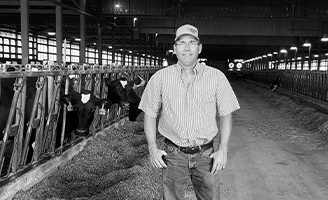Brad Clark, United States
Nominated by Adam Kramer, Black Sand Granary and Growers United
Nominated by Adam Kramer, Black Sand Granary and Growers United
 “Several years ago we began formulating a transition plan to implement primary practices, secondary practices, and eventually enhancement practices. We took the approach of adjust, sustain, and enhance, understanding it was going to take some time to see the benefits. Our farm has come a long way in a few years and we have a long way to go but we are in a much better place today than we once were. Change is hard but can be good and if it benefits the environment, you can’t hardly go wrong.”
“Several years ago we began formulating a transition plan to implement primary practices, secondary practices, and eventually enhancement practices. We took the approach of adjust, sustain, and enhance, understanding it was going to take some time to see the benefits. Our farm has come a long way in a few years and we have a long way to go but we are in a much better place today than we once were. Change is hard but can be good and if it benefits the environment, you can’t hardly go wrong.”
Climate Positive Practices
Brad Clark is a row crop and dairy cow producer in Bagley, Wisconsin, who has implemented never-till, block planting and perennial vegetation practices to raise soybeans, barley, rye and wheat as commodity crops, and corn and alfalfa as cattle feed. Located at the confluence of the Wisconsin and Mississippi Rivers, inter-seeds cover crops over corn via airplane, then utilizes a multi-species cover crop following the small grains in rotation, extending the growing season for the cover crops and increasing dry biomass. Block planting has enabled Brad to eliminate multi-crop strips within field boundaries, producing better yields, improved production efficiency and virtually no erosion. Non-productive field edges near forested land is taken out of the cropping plan and put into perennial vegetation for additional grazing areas for dairy cattle.
With these climate positive practices, Brad has decreased crop production input costs by $60-$85/acre, depending on the crop, without sacrificing any noticeable yield. Small grains supplement the dairy cattle alfalfa feed as well as producing on-farm straw producing measurable savings.